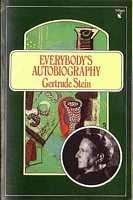
Everybody's Autobiography - Gertrude Stein
Check my rate
| Main centres: | 1-3 business days |
| Regional areas: | 3-4 business days |
| Remote areas: | 3-5 business days |

| Main centres: | 1-3 business days |
| Regional areas: | 3-4 business days |
| Remote areas: | 3-5 business days |
Published by Virago, 1985, softcover, illustrated, 278 pages, condition: as new.
n 1937, Gertrude Stein wrote a sequel to The Autobiography of Alice B. Toklas , but this darker and more complex work was long misunderstood and neglected. An account of her experiences in the wake of having authored a bestseller, Everybodys Autobiography is as funny and engaging as The Autobiography of Alice B. Toklas , but it is also a meditation on the meaning of success and identity in America. Everybodys Autobiography is Stein at her most accessible and her most serious, and is among her most popular books.
"After all one is brought up not a Christian but in Christian thinking and I can remember being very excited when I first read the Old Testament to see that they never spoke of a future life, there was a God there was eternity but there was no future life and I found how naturally that worried me, that there is no limit to space and yet one is living in a limited space and inside oneself there is no sense of time but actually one is always living in time, and there is the will to live but really when one is completely wise that is when one is a genius the things that make you a genius make you live but have nothing to do with being living that is with the struggle for existence. Really genius that is the existing without any internal recognition of time has nothing to do with the will to live, and yet they use it like that. And so naturally science is not interesting since it is the statement of observation and the laws of science are like all laws they are paper laws, as the Chinese call them, they make believe that they do something so as to keep every one from knowing that they are not going on living. But after all I was a natural believer in republics a natural believer in science a natural believer in progress and I began to write. After all I was a natural believer just as the present generation are natural believers in Soviets and proletarian literature and social laws and everything although really it does not really make them be living any more than science and progress and democracies did me. This is what I mean. After all if you ask a question unless not even then when you are very little is the answer interesting, if there is an answer why listen to it if you can ask another question, listening to an answer makes you know that time is existing but asking a question makes you think that perhaps it does not."